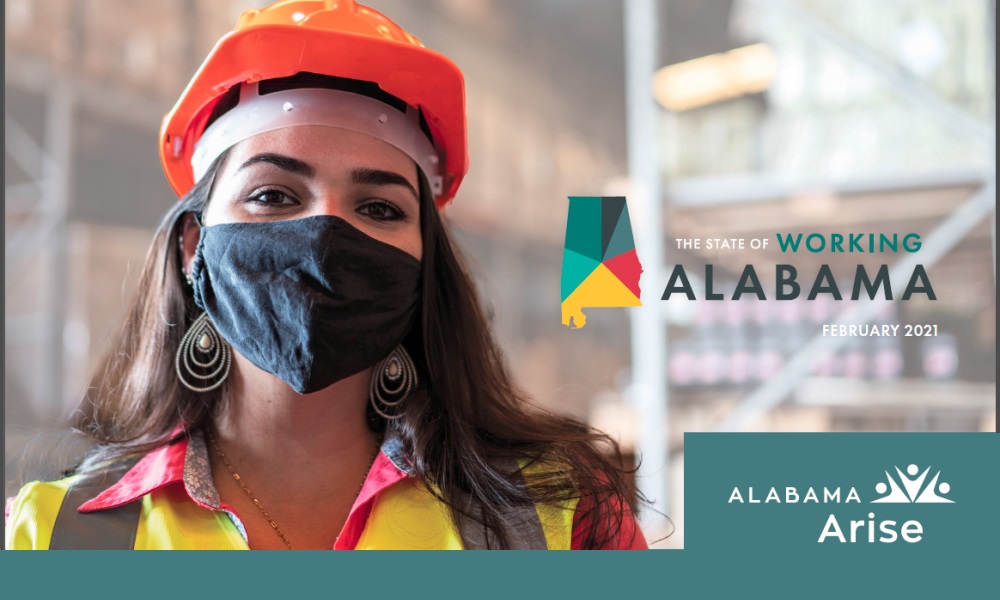 ALABAMA ARISE
ALABAMA ARISE
The “essential workers” hailed as pandemic heroes often lack the basic protections of a living wage, health insurance, paid sick leave and family medical leave, according to a new report titled “The State of Working Alabama” from the nonprofit Alabama Arise.
The report, from a team of nonpartisan public policy experts, details how COVID-19 has illuminated failures in Alabama’s health care system and revealed how low-wage workers bear the burden of being “essential” to the economy but forgotten during this health crisis.
Aligning with public health experts who have long called for Medicaid expansion, the report recommends lawmakers immediately expand the program that would cover more than half of those currently uninsured.
Medicaid expansion would do more than insure those workers. It would also facilitate COVID-19 testing, treatment and vaccination; allow working people to stay healthier and more productive; and strengthen Alabama’s health care system, especially rural hospitals, according to the report.
To policy and public health experts, expansion is the clear-cut first step to address a long list of issues old and new. Instead of emphasizing sustainable recovery from the pandemic recession, lawmakers quickly passed “pro-business” bills at the start of this legislative session.
These measures included a new law providing a broad range of civil immunity against claims related to coronavirus exposure. Alabama Arise executive director Robyn Hyden said policymakers need to focus on addressing their constituents’ urgent needs during and beyond the COVID-19 pandemic.
“Legislators spent the first two weeks of this session protecting the interests of corporations,” Hyden said. “They should spend the rest of the session protecting the interests of the people of Alabama. And Arise’s State of Working Alabama report provides a blueprint for how to do just that.”
Black, Hispanic, low-wage workers hurt the most
The report includes measures to address racial disparities in health care that have been worsened by COVID-19, including the recommendation to adopt a rigorous program of data collection across state agencies to identify disparities in health outcomes related to race, ethnicity, income and geography. Policy experts suggest an effort to engage research universities and state health agencies in developing and implementing a strategic plan to reduce targeted health disparities.
The health and economic toll of COVID-19 has fallen heavily on women, Black and Hispanic/ Latinx Alabamians. According to the report, only 46.4% of Black workers and just 35.5% of Hispanic/Latinx workers had health insurance through their jobs before the pandemic. And within those groups, Alabamians working in low-wage industries suffered disproportionate job losses, while unemployment insurance has left even more out of coverage.
So close to the one-year mark for Alabama’s first confirmed case of COVID-19 on March 13, the state is finally seeing a sharp decline in cases. After a slow and challenging rollout of vaccinations, by Friday the state had vaccinated 440,983 people with both doses, approximately 8.9% of its population, according to the latest data from the Alabama Department of Public Health.
The good news came after a long year. About 10.2% of Alabamians have been sick with COVID-19, with 502,263 cases reported. The health department estimates 46,442 hospitalizations and 10,274 deaths have been caused by coronavirus. But there’s still a long way to go.
“When the COVID-19 pandemic hit Alabama in March 2020, it didn’t just cause massive human suffering and economic disruption,” the Arise report says. “It also revealed suffering and disruption that have long existed and that policymakers have long neglected — or even perpetuated.”
The report also suggests the state make these policy changes:
- Guarantee permanent paid sick leave for all working Alabamians, so that no one has to choose between earning a paycheck and going to work sick.
- Roll back the 2019 cuts to Alabama’s unemployed insurance benefits and create a modernized claims system capable of handling future crises.
- Provide state support for the Alabama Housing Trust Fund and abandon efforts to impose harmful limits on safety net programs.
- Expand high-speed, affordable broadband technology, targeting rural and low-income communities and explicitly addressing racial equity in broadband access.



























